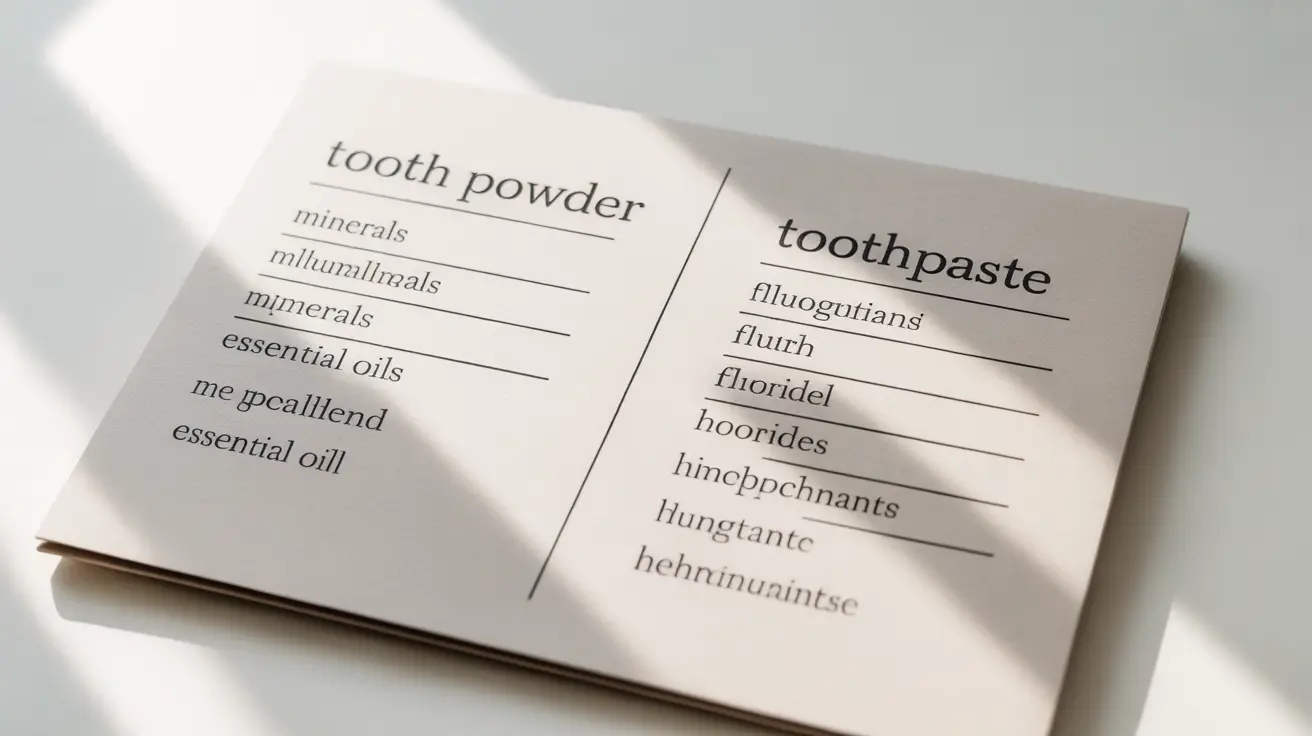As more people explore alternatives to traditional oral care products, the debate between tooth powder and toothpaste has gained significant attention. Both options aim to maintain oral hygiene, but they differ considerably in their composition, application, and potential benefits. Understanding these differences can help you make an informed decision about which product might better suit your oral health needs.
In this comprehensive guide, we'll explore the key distinctions between tooth powder and toothpaste, examining their effectiveness, safety, and specific benefits for different oral health concerns.
Understanding the Basics: Composition and Ingredients
Tooth powder and toothpaste differ significantly in their fundamental composition. Traditional toothpaste consists of a gel or paste base containing water, humectants, and thickening agents, along with active ingredients. In contrast, tooth powder is a dry mixture of minerals and cleaning agents without any liquid components.
Common Ingredients in Tooth Powder
- Calcium carbonate or bentonite clay as the primary cleaning agent
- Essential oils for flavor and antimicrobial properties
- Natural minerals for remineralization
- Herbs and spices with potential antibacterial properties
- Optional natural sweeteners like stevia or xylitol
Traditional Toothpaste Components
- Fluoride for cavity prevention
- Surfactants for foaming action
- Humectants to prevent drying
- Artificial sweeteners and flavoring agents
- Preservatives to extend shelf life
Effectiveness and Clinical Benefits
Both tooth powder and toothpaste can effectively clean teeth when used properly. Tooth powder's abrasive nature may provide superior mechanical cleaning, while toothpaste's formulation often includes specific ingredients targeted at various oral health concerns.
Plaque Removal and Whitening
Tooth powder's finer particles can provide excellent mechanical cleaning action, potentially offering superior plaque removal and natural whitening effects. However, users must exercise caution to avoid excessive abrasion of tooth enamel.
Cavity Prevention
Traditional toothpaste containing fluoride has a well-documented history of cavity prevention. While some tooth powders may include natural remineralizing ingredients, they might not provide the same level of cavity protection unless specifically formulated with fluoride.
Safety Considerations and Usage Guidelines
Both products are generally safe when used as directed, but each requires specific considerations for optimal use and safety.
Using Tooth Powder Safely
- Start with a small amount to avoid excess abrasion
- Wet your toothbrush before applying the powder
- Brush gently to prevent enamel wear
- Store in a dry place to prevent contamination
- Check ingredient lists for potential allergens
Special Considerations for Sensitive Teeth
People with sensitive teeth should carefully evaluate their options. While some natural tooth powders may be gentler, others might exacerbate sensitivity due to their abrasive nature. Toothpaste formulated specifically for sensitive teeth often contains desensitizing ingredients not found in most tooth powders.
Frequently Asked Questions
What are the main differences between tooth powder and toothpaste in terms of ingredients and effectiveness? Tooth powder is a dry mixture of minerals and natural cleaning agents, while toothpaste contains water, humectants, and various active ingredients. Both can be effective, but tooth powder typically offers more mechanical cleaning action, while toothpaste often includes targeted therapeutic ingredients.
Is tooth powder more effective than toothpaste for whitening teeth and removing plaque? Tooth powder's abrasive nature can provide excellent mechanical cleaning and natural whitening effects. However, its effectiveness depends on proper use and the specific formulation. Some toothpastes may offer comparable or better results through chemical whitening agents and specialized plaque-fighting ingredients.
Does tooth powder contain fluoride, and how important is fluoride for cavity prevention? Most natural tooth powders do not contain fluoride, though some commercial versions may include it. Fluoride plays a crucial role in cavity prevention by strengthening tooth enamel and reducing decay. Those choosing fluoride-free options should discuss alternative cavity prevention strategies with their dentist.
Are tooth powders safe to use, and what precautions should be taken compared to toothpaste? Tooth powders are generally safe when used correctly. Key precautions include using gentle brushing technique, starting with small amounts, and ensuring proper storage in dry conditions. Users should also check for ingredient sensitivities and avoid excessive abrasion.
Which is better for sensitive teeth or people seeking natural oral care: tooth powder or toothpaste? For sensitive teeth, specially formulated toothpaste often provides better relief due to specific desensitizing ingredients. However, those seeking natural oral care might prefer gentle tooth powders with minimal ingredients. The best choice depends on individual needs and sensitivities.




